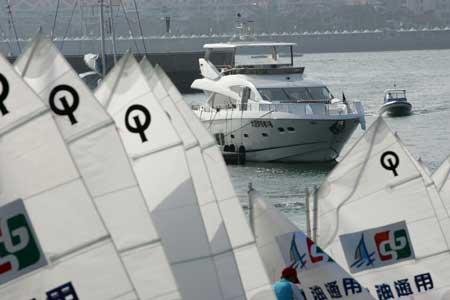
A vessel looks for moorage on Monday in the busy Qingdao Olympic Marina in East China's Shandong province, which is home to more than 300 yachts. [Cui Meng / China Daily]
QINGDAO, Shandong - Yacht owners in China tend to keep a low profile, both to conceal their wealth and protect their privacy."A yacht is like a mobile home: You don't want to invite crowds to visit your home, right?" said Dong Yongquan, president of the Qingdao International Yacht Club, which has been operating the Qingdao Olympic Marina since the end of the 2008 Olympic sailing events.
A security door gives access to a floating dock where hundreds of yachts bob in the water and tanned sailors, many wearing blue and white shirts, mill about.
Once in a while, club members equipped with diving gear jump into the water.
"The celebrities are very concerned about their personal lives," Dong said, adding that T-shirts and bikinis are the owners' favorite attire when they are out on the water.
If a stranger or a tourist tries to get too close, security guards perk up and, if necessary, ask them to leave.
Yachts kept in the harbor are big and easily capable of long, international journeys. However, the yacht owners have to go through complicated procedures set by the government before they can depart on such trips.
According to China Cruise & Yacht Industry Association (CCYIA), there are about 100 yacht clubs in China, each with their own facilities.
"The owners come here mostly in the summer when it is cool and comfortable. When it gets colder, they will move to the warmer south, mostly to Sanya, Hainan province," said Ma Guanqun, executive manager of the club.
The Qingdao Olympic Marina is home to more than 300 yachts, including several Sunseekers, the top luxury yacht brand in the world.
"About half of them belong to companies or local governments, and the other half are private," Dong said.
"Here, 60 percent of the yacht owners are from Qingdao, and most of them are in the real estate business," Ma said.
For corporate and government yacht owners, such a vessel offers a novel place to socialize.
"Just imagine talking with your customers on the deck with the breeze blowing and the sun shining - it is so much cooler than talking during a dinner at a restaurant," said a businessman who was unwilling to give his name.
"Yachts are not like cars: You can buy a parking space in a city, but you can't find a harbor in a landlocked city," Dong said. "That's why many rich men living in inland cities hesitate about buying yachts."
Living far from the sea is not the only hurdle that keeps some of the affluent away from yachts - many mistakenly believe that luxury cars and villas are the best status symbols.
Dong said most yacht owners made the decision to buy a vessel after seeing how popular yachts are in Western countries.
Now, Dong said, some of the truly rich people in China are competing not only in the arena of luxury cars and villas, but for bigger and better yachts.
Dong recalled that "an important businessman" got very upset when his 24-meter powerboat was dwarfed by a newly arrived 49-meter luxury yacht.
"The member moved his yacht to the other side of the marina and said he was going to buy a larger one right away," Dong said.
Li Yuexian, CEO of Sunbird Yacht, a major yacht manufacturer in China, told China Daily that most of his customers have assets of at least 10 million yuan.
Those who buy a luxury yacht need deep pockets, not just for the initial purchase but also for ongoing maintenance. A regular yacht berth costs between 130,000 and 170,000 yuan each year and a space for a large yacht will cost a lot more.
Moreover, large vessels can guzzle a lot of gas. According to Ma, it costs 80,000 yuan to fill the tank of a 24-meter powerboat.
"Even for people who earn a six-digit income every year, a yacht is too much to afford but if they really love sailing, they can choose to rent one," Li said.
He said people can rent a 24-meter powerboat for around 10,000 yuan (about $1,500) an hour.





